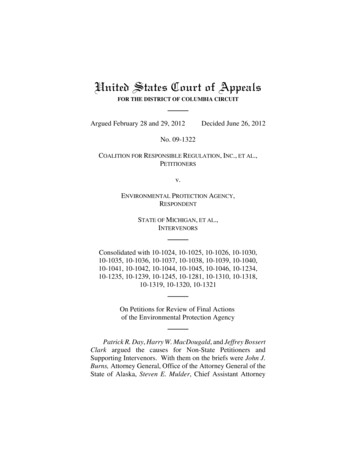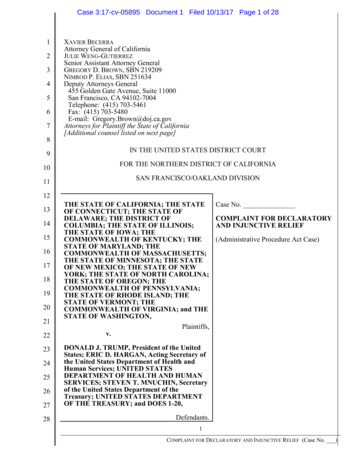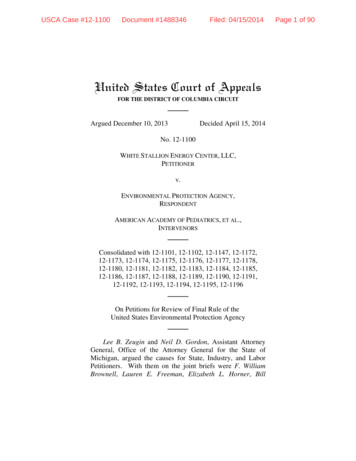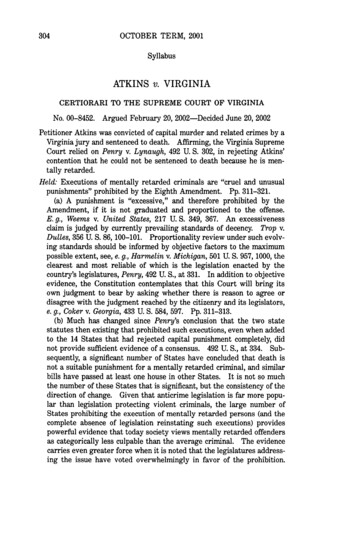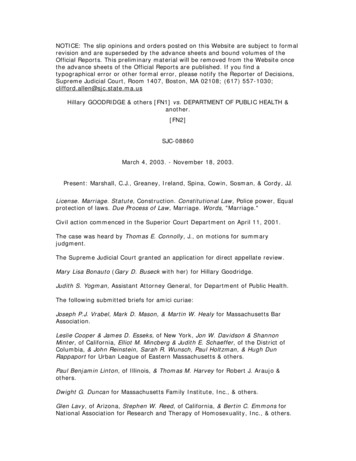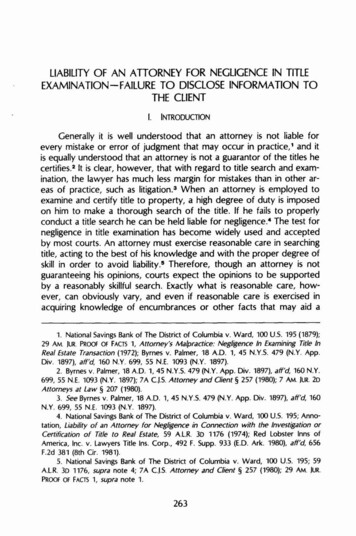
Transcription
LIABILITY OF AN ATTORNEY FOR NEGLIGENCE IN TITLEEXAMINATION-FAILURE T O DISCLOSE INFORMATION TOTHE CLIENTGenerally it is well understood that an attorney is not liable forevery mistake or error of judgment that may occur in practice,' and itis equally understood that an attorney is not a guarantor of the titles he ertifies. It is clear, however, that with regard to title search and examination, the lawyer has much less margin for mistakes than in other areas of practice, such as litigation.3 When an attorney is employed toexamine and certify title to property, a high degree of duty is imposedon him to make a thorough search of the title. If he fails to properlyconduct a title search he can be held liable for negligen e. The test fornegligence in title examination has become widely used and acceptedby most courts. An attorney must exercise reasonable care in searchingtitle, acting to the best of his knowledge and with the proper degree ofskill in order to avoid liability. Therefore, though an attorney is notguaranteeing his opinions, courts expect the opinions to be supportedby a reasonably skillful search. Exactly what is reasonable care, however, can obviously vary, and even if reasonable care is exercised inacquiring knowledge of encumbrances or other facts that may aid a1. National Savings Bank of The District of Columbia v. Ward, 100 U.S. 195 (1879);29 AM. JuR.PROOF OF FACTS 1, Attorney's Malpractice: Negligence In Examining Title InReal Estate Transaction (1972); Byrnes v. Palmer, 18 A.D. 1, 45 N.Y.S. 479 (N.Y. App.Div. 1897), aff'd, 160 N.Y. 699, 55 N.E. 1093 (N.Y. 1897).2. Byrnes v. Palmer, 18 A.D. 1,45 N.Y.S. 479 (N.Y. App. Div. 1897), aff'd, 160 N.Y.699, 55 N.E. 1093 (N.Y. 1897); 7A C.J.S. Attorney and Client 5 257 (1980); 7 AM. JUR. 20Attorneys at Law 5 207 (1980).3. See Byrnes v. Palmer, 18 A.D. 1, 45 N.Y.S. 479 (N.Y. App. Div. 1897), aff'd, 160N.Y. 699, 55 N.E. 1093 (N.Y. 1897).4. National Savings Bank of The District of Columbia v. Ward, 100 U.S. 195; Annotation, Liability o f an Attorney for Negligence in Connection with the Investigation orCertification of Title to Real Estate, 59 A.L.R. 3D 1176 (1974); Red Lobster Inns ofAmerica, Inc. v. Lawyers Title Ins. Corp., 492 F. Supp. 933 (E.D. Ark. 1980), aff'd, 656F.2d 381 (8th Cir. 1981).5. National Savings Bank of The District of Columbia v. Ward, 100 U.S. 195; 59A.L.R. 3D 1176, supra note 4; 7A C.J.S. Attorney and Client 5 257 (1980); 29 AM. JUR.PROOF OF FACTS 1, supra note 1.
264The Journal of the Legal Profession[Vol. 13:263client's decision, the attorney may still be liable for negligence in failingto disclose such fact . The most common negligence claims arising in title cases usuallyinvolve failing to discover encumbrances, but attorneys have also beenheld liable for errors in determining ownership of title, and failing toproperly describe the amount or location of property.' In a malpracticeaction, "the client must prove the attorney's employment and the creation of a duty t o exercise his skill, the attorney's neglect of duty, thatsuch negligence was the proximate cause of loss to the client, and thedamages su tained." In title search cases this usually translates into theclient being able to prove (1) unmarketable title; (2) that the defectwould have been discovered in the exercise of reasonable and ordinary skill, care, knowledge and diligence; and (3) that the client suffereddamage in reliance o n the attorney's certifi ate. 11.RELATIONSHIPAND DUTYOnce the attorney has entered into employment with the clientfor a title search, the question that must be answered is exactly what isthe duty owed and the relationship presented in exercising ordinaryknowledge and skill? Courts have usually imposed a strong duty onattorneys in title cases. It appears that the reason for this is because thelay person generally knows little about searching title. Therefore, therelationship between attorney and client is an important one. In Anderson v. Neal,l0 the Supreme Court of Maine explained the relationshipbetween attorney and client in title examination cases as follows:The essence of the attorney-client relationship in title cases isthe faith and trust which the client places in the representations ofthe attorney regarding the status of the title to the property he isabout to purchase. The security of knowing that the title is goodand the property is free of encumbrances is what the clientpurchases when he retains an attorney to search title for him."This trust relationship indicated above seems to be a general theme in6. Owen v. Neely, 471 S.W.2d 705 (Ky. 1971).7. 59 A.L.R. 3D, supra note 4, at 1179.8. 29 AM. jUR. PROOF OF FACTS, supra note 1, at 4.9. Wlodarek v. Thrift, 178 Md. 453, 13 A.2d 774 (1940); Peters, Attorney Liabilityfor Examination and Certification of Title to Real Estate, 12 COLO. LAW. 1091 (July 1983).10. 428 A.2d 1189 (Me. 1981).11. Id. at 1192.
19881Negligence in Title Examination265many negligence actions involving title searches,12 and may explain whyan attorney's duty is so high.Once the relationship between attorney and client has been established, an attorney can be held liable for negligence if he fails t o "discharge some duty which was fairly within the purview of his employment, . . ." and the client relied on the statements or omissions in thetitle certificate to his detriment.' The degree of duty owed, however,can vary depending on the court and the facts of each case. As mentioned previously, the test used by courts in most title negligence suitsis one of reasonableness. The attorney must "exercise that degree ofreasonable knowledge and skill that lawyers of ordinary ability and skillpossess and exercise" when he undertakes a title search.14 The Supreme Court of New Jersey in St. Pius X House of Retreats v. CamdenDioc.,lS stated very clearly the duty of an attorney under this standardas follows:What constitutes a reasonable degree of care is not to be considered in a vacuum but with reference to the type of service theattorney undertakes to perform. More specifically, where the attorney represents the purchaser of realty and has been engaged toexamine title, it has been said: "It is the duty of an attorney, who isemployed to investigate the title to real estate, to make a painstaking examination of the records and to report all facts relating t o thetitle. He is therefore liable for any injury that may result to his clientfrom negligence in the performance of his duties - that is, from afailure to exercise ordinary care and skill in discovering in therecords and reporting all the deeds, mortgages, judgments, &c.,that affect the title in respect to which he is employed."leThe duty an attorney owes therefore is not only to search title, but alsoto disclose what he finds as a result of the search. For example, inByrnes v. Palmer,17 it was stated that an attorney has the duty "to see12. See, e.g., St. Pius X House of Retreats v. Diocese of Camden, 88 N.J.571, 443A.2d 1052 (1982).13. Home Federal Sav. & Loan Ass'n v. Spence, 259 Md. 575, 270 A.2d 820, 825(1970).14. St. Pius X House of Retreats v. Diocese of Camden, 88 N.J. 571, 443 A.2d1052, 1060-61 (1982).15. Id.16. Id. at 443 A.2d 1061, (quoting Jacobsenv. Petersen, 91 N.J.L.404, 103 A. 983(N.J.Sup. Ct. 1918), aff'd,92 N.J.L.631, 105 A. 894 (N.J. 1918)).17. 18 A.D. 1, 45 N.Y.S. 479 (N.Y. App. Div. 1897), aff'd,160 N.Y. 699, 55 N.E.1093 (N.Y. 1897).
266The Journal of the Legal Profession[Vol. 13:263that his client obtains a marketable title, and to reject titles involved indoubt, unless the client is fully informed of the nature of the risk, and iswilling to accept it."18 It is important that the attorney disclose information revealed in a title search not only because courts impose such aduty, but also because disclosure is an affirmative defense to a negligence action based on improper title examination.18111.KNOWLEDGEAND DISCLOSUREFurthermore, liability for negligence may be more likely when anattorney has knowledge of a defect, yet still does not disclose it to hisclient. For example, in the principal case of Owen v. Neel , Oan attorney relied on an erroneous survey description in preparing a deed toproperty. The record description of the property was in conflict withthe survey description, yet the attorney used the survey description inthe deed, which resulted in damages to his client. The attorney hadrecognized the discrepancy but failed to inform his client, or to find outwhich description was correct. The court held that:The average layman is not familiar with and ordinarily does not understand legal descriptions, and if his lawyer, accidentally or otherwise, receives information that should reasonably put him on noticeof a defect we think it is his duty to investigate or report it to hisclient .*IEven though the attorney in the Owen case had placed a disclaimer inhis title opinion, the court nevertheless emphasized the fact that he hadnotice of the conflicting descriptions in holding the attorney liable.Likewise, in Republic Oil Corp. v. D a n i g e ran, attorney was retained to conduct a title search of property, and to discharge all encumbrances that were found. Before the closing of the sale the attorney discovered a perfected security interest in the property, but failedto either discharge it or disclose it to his client. The attorney stated thatif his client had "known about the lien before the closing, 'it wouldhave jeopardized the situation and not made it a workable situation.' "23 The appellate court affirmed the trial court's granting of sum18. Id. at 45 N.Y.S. 482.19. Gleason v. Title Guarantee Co., 300 F.2d 813 (5th Cir. 1962), reh'g denied, 317F.2d 56 (5th Cir. 1963).20. 471 S.W.2d 705 (Ky. 1971).21. Id. at 708.22. 9 Mass. App. Ct. 858, 400 N.E.2d 1315 (1980).23. Id. at 400 N.E. 2d 1317; see abo Palmer v . Nissen, 256 F. Supp. 497 (S.D. Me.
19881Negligence in Title Examination267mary judgment against the attorney.In attempting to discover relevant matters worthy of disclosure ina title examination, the attorney also has the duty to in fact check thetitle, and cannot rely on what others may have told him. This is illustrated in Cleason v. Title Guarantee C rnpany, 'where an attorneytelephoned an abstract company and relied on the information he received in preparing a title certification. The attorney had neitherchecked the public records, nor had he examined a written abstract,and the title later proved to be defective. The court found the attorneynegligent even though it was customary in the community to inquire bytelephone about the state of title from an abstract company. The courtwent on to state that "[all1 customs are not good customs, and lawyershave no prescriptive right to make knowingly false statements in thename of custom."25An additional example of this concept can be found in Wlodarekv. ThriftPz6where a directed verdict in favor of an attorney was reversed when the court found that there may have been sufficient evidence to support allegations that the attorney was negligent in certifying title to property, which proved to be defective. The client allegedthat the attorney did not make an actual title search, but instead merelyrelied on the word of the seller of the property in question. In reversingthe lower court's verdict, the court stated that if the attorney had usedreasonable care in searching the title, the defect would have beendiscovered.Therefore, when employed to examine title to property, the attorney not only has a duty to disclose relevant defects, but also to actuallymake a reasonable search for such defects. Reliance on others, such asan abstract company, may not suffice since it is the attorney's ultimateobligation to certify the title.1V. DISCLOSURE IN OTHER AREASCourts seem to be invoking a duty on attorneys to disclose knowledge of material facts not only in title cases, but others as well. In1966) (Where the court, applying Maine law, found an attorney liable when he improperly described a boundary line in a purchase agreement for the sale of property. Theattorney knew the boundary lines that were to be included in the sale, but by failing toproperly describe the line, the amount of property to be sold was overstated resultingin a defect of title as to a part of the property purchased).24. 300 F.2d 813 (5th Cir. 1962), reh'g denied, 317 F.2d 56 (5th Cir. 1963).25. Id. at 300 F.2d 814.26. 178 Md. 453, 13 A.2d 774 (1940).
268The Journal of the Legal Profession[Vol. 13:263Spector v. Marrnel tein, an attorney represented his client in severalloan transactions. The client loaned money to a corporation that was inextreme financial difficulty. The attorney had been present in meetingswith the corporation officers and knew before the client made theloans that there was not enough income generated by the corporationto pay already existing debts. Furthermore, the attorney knew that thesame security his client obtained for the loan was already secured byanother previous loan made by a third party. The lawyer never informed his client about the likely possibility the loan would not be repaid, or of the improper security on which the loan rested. In findingthe attorney negligent, the court explained that:A client is entitled to all the information helpful to his causewithin his attorney's command. If an attorney negligently or willfullywithholds from his client information material to the client's decision to pursue a given course of action, or to abstain therefrom,then the attorney is liable for the client's losses suffered as a resultof action taken without benefit of the undisclosed material facts.Material facts are those which, if known to the client, might wellhave caused him, acting as a reasonable man, to alter his proposedcourse ofIt is interesting t o observe that title insurance companies have alsorecently been held liable for negligence in failing to disclose defectswhen they begin t o structure defects as an attorney or abstractorwould. In the past, title insurance companies were generally not subjectto negligence actions for failure to discover and disclose a defect intitie. This was because insurance companies were generally not employed to examine title, but only to indemnify against loss resultingfrom a defect.29 Today, however, title insurance companies have increasingly been undertaking the duties of both attorney and insurer.Many insurance companies issue title commitments which specify defects, and then also issue the policy indemnifying against loss from thedefects listed.30 Some recent decisions have held that when these insurance companies schedule defects, they are undertaking the same duties27. 361 F. Supp. 30 (S.D.N.Y. 1972), aff'd, 485 F.2d 474 (2nd Cir. 1972).28. Id. at 361 F. Supp. 39-40.29. Stone v. Lawyers Title Ins. Corp., 537 S.W.2d 55 (Tex. Civ. App. 1976), aff'dinpart, rev'd in part, 554 S.W.2d 183 (Tex. 1977); see also Anderson v. Title Ins. Co., 103Idaho 875, 655 P.2d 82 (1982).30. Shada v. Title & Trust Co. of Florida, 457 So. 2d 553 (Fla. Dist. Ct. App. 1984),petition for review denied, Title & Trust Co. of Florida v. Shada, 464 So. 2d 556 (Fla.1985).
19881Negligence in Title Examination269as attorneys and abstractors. Therefore, a duty of reasonable care willbe imposed on the company, which if not exercised, will result in liability for negligen e. 'V.CONCLUSIONThe duty that has been placed on attorneys is obviously strongwhen the attorney knows of a material fact but does not disclose it tohis client. Yet with regard to title examination cases, the duty can beeven stronger in that the attorney should exercise reasonable care andskill both in discovering those material facts, and in disclosing them tohis client.32Of course an attorney is not a guarantor of title,33 but asthe above cases have indicated, the attorney is in effect guaranteeingthat he has reasonably searched the title, and that all defects have beendisclosed when he issues his certificate. If he has not taken such reasonable care he can be held liable. Unless there was contributory negligence,S4 or no reliance on the part of the client, the only two majordefenses remaining for the attorney are that he disclosed the defect, orthat the Statute of Limitations has run.35Even a disclaimer will not protect the attorney when he has reasonable grounds to suspect the existence of a defect not disclosed in his opinion.36Therefore, the best way for an attorney to avoid liability is tomake a thorough search of the records, and disclose everything hefinds of any materiality. Any less, and the attorney will be taking the riskof a possible malpractice action, a high risk in a litigious society.Robert S. Frost31. Id.32. Owen v. Neely, 471 S.W.2d 705 (Ky. 1971); St. Pius X House of Retreats v.Diocese of Camden, 88 N.J. 571, 443 A.2d 1052 (1982).33. Byrnes v. Palmer, 18 A.D. 1, 45 N.Y.S. 479 (N.Y. App. Div. 1897), aff'd, 160N.Y. 699, 55 N.E. 1093 (N.Y. 1897); 7A C.J.S. Attorney and Client 5 257 (1980).34. See 59 A.L.R. 3D 1176, supra note 4; 29 AM. JUR. PROOF OF FACTS 1, supra note1; see also United Leasing Corp. v. Miller, 60 N.C. App. 40, 298 S.E.2d 409 (N.C. Ct.App. 1982), review denied, 308 N.C. 194, 302 S.E.2d 248 (1983) (Where client wasfound to be contributively negligent having had notice of a deed of trust on propertythat was not disclosed in attorney's title search letter).35. 59 A.L.R. 3D 1176, supra note 4, 29 AM. JUR. PROOF OF FACTS, supra note 1.36. Owen v. Neely, 471 S.W.2d 705 (Ky. 1971).
ertifies. It is clear, however, that with regard to title search and exam- ination, the lawyer has much less margin for mistakes than in other ar- eas of practice, such as litigation.3 When an attorney is employed to . for Examination and Certification of Title to Real Estate, 12 COLO. LAW. 1091 (July 1983). 10. 428 A.2d 1189 (Me. 1981). 11 .

